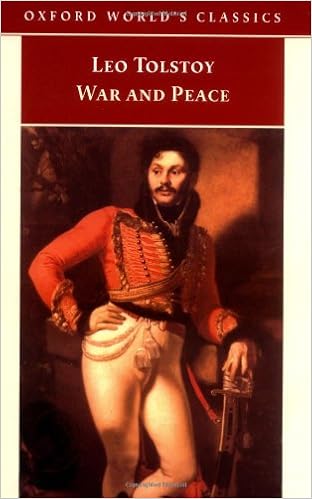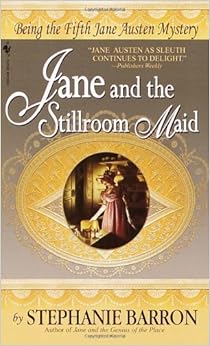One of the major books on that latter list is War and Peace by Leo Tolstoy, a book that most of my generation was introduced to as that last minute book report read that Charlie Brown had to finish up on New Year's Eve. Along with Anna Karenina, W&P is the title that comes to mind when anyone makes a joke about starting long Russian novels.
I happen to love long novels, classics and contemporary alike. Just in my Morning Reads alone, lengthy page turners such as Moby Dick, Vanity Fair and Les Miserables have been able to escape my TBR piles and find a place on my classic books shelves.
However, W&P presents quite a challenge, as it has dozens of subplots, a multitude of characters and a plethora of passages describing the intricate details of military action. In other words, it's the ultimate saga story.
I'm only two hundred and fifty pages in at this point yet I've already encountered the war portion of the story as the Russian forces battle against the invading armies of Napoleon Bonaparte. You do feel as if you're walking beside the soldiers, older men with their own ideas about what will happen and younger ones eager for action yet not sure of themselves when push comes to serious shove.
Tolstoy does paint the elaborate picture as various troops and officers go between moments of tedium and intense attacks, causing more than one soldier to become bewildered and lose his way during the firefight frenzy:
Meanwhile, there's a good deal of "peace" right from the beginning as social encounters at a party lead to several intrigues and potential romances.
As in any polite society, you have a good amount of manipulators with the likes of Princess Anna Mihalovna scheming to get her son Boris as much status as she can to Prince Vassily(a lot of prince and princess titles are attached to numerous characters here), whose quiet yet powerful influence is felt among his peers.
To balance them out, you have kinder folk such as Pierre, who is surprised to find himself as the heir to the family estate that barely acknowledged him as a bastard son and Princess Mary, the meek and mild daughter of the bullying Prince Bolkonsky(so can't stand him!) who thinks nothing of belittling her in order to secure his own comfort.
He's not that much more civil to anyone else in his social circle,or outside it for that matter, but I still feel for Princess Mary, as she sadly gives up a chance at marriage,due partly to her father's fierce nature but also the feckless nature of her potential fiance. There are more glamorous types in this story such as the captivating Natasha, but my eye will be on Princess Mary as things roll on here:
My choice of translation was the Maude, as in Aylmer and Louise Maude who were friends of Tolstoy and given his seal of approval for his works. My reason for choosing this particular translations comes from a far shorter book than W&P yet it plays a pivotal part in the bookish lives of it's authors.
Used and Rare by Lawrence and Nancy Goldstone is the first in a trilogy by this husband and wife team about their adventures in the book collecting world. They were dedicated readers to start with but it was a search for W&P that lead them to the realm of first editions and collectable tomes.
As part of a friendly birthday competition, Nancy sought out a stylish yet affordable hardcover edition of the book and after a few dead ends, came across a lovely copy(complete with maps) in her price range that won her the bet. That copy,which pleased Lawrence so much and got the two of them more interested in this area of books, was a Maude and I'm happy to report that it's a very engaging translation indeed.
Granted, my copy is a big thick Oxford Classics paperback but it's in good shape with proper print size(vitally important for incredibly long books) and that's all I need. I do have an edition of Anna Karenina but Constance Garnett is the translator and her take on the prose just doesn't work for me. I might have to find the Maude for that or maybe the more modern one chosen for Oprah's book club a few years back. Finding the right translation does make the difference, I've found:
So, why War and Peace and why now? Well, it's not just for the bragging rights,although I have had this big boy on my Must Read Classics shelf for a good long while.
W&P is one of those literary mountains that you do want to climb simply because it's there but that isn't my main motivation here. I chose to read this book at this time as an act of offbeat optimism.
I'm not about to get into politics here but more than likely, anyone reading this is well aware of the state of things in this country and elsewhere. Plenty of tension, infighting, natural disasters and threat of another major world war looms over our heads a lot closer than they used, it seems.
Like most folks, I get riled up at what's going on and do what I can, yet it can get overwhelming at times,especially since it's hard to know who to talk to about all of this. While I have some family and friends(online and off) that I can share my thoughts with, the increasing amount of vitriol that pops up during every other social media discussion makes speaking freely feel harder than it should be.
So, to have a positive focus to my outlook these days, I chose to read War and Peace as a sign of hope that the world at large will remain intact long enough for me to finish this book. A weird reason, maybe, but I think a good one. Tolstoy meant for W&P to be a lesson in history more than a novel and so far, it's been rather enlightening to say the least.
By the time I do finish the book, the world will hopefully be in a better place than we are at the moment. I don't expect actual world peace,of course, but I do hope that we all gain some perspective from this moment in history and with any luck, a writer as good as Tolstoy will be around to tell our story for future generations to come:
































